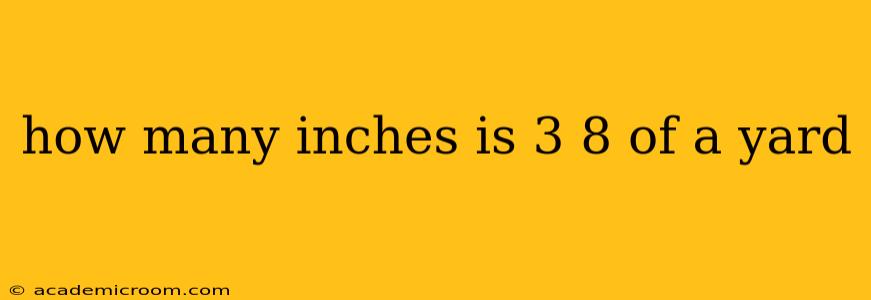How Many Inches Are in 3/8 of a Yard? A Comprehensive Guide
This seemingly simple question about unit conversion opens the door to understanding fundamental measurement concepts. Let's break down how to calculate the number of inches in 3/8 of a yard, and then explore some related questions.
Understanding the Units
Before we dive into the calculation, let's clarify the units involved:
- Yard: A yard is a common unit of length in the imperial system, equal to 3 feet or 36 inches.
- Inches: An inch is a smaller unit of length, with 12 inches equaling 1 foot.
The Calculation
To find the number of inches in 3/8 of a yard, we'll follow these steps:
-
Determine the inches in one yard: We know 1 yard = 36 inches.
-
Calculate 3/8 of a yard: We multiply the total inches in a yard (36) by the fraction 3/8: 36 inches * (3/8) = 13.5 inches.
Therefore, 3/8 of a yard is equal to 13.5 inches.
Frequently Asked Questions (FAQs)
Here are some related questions often asked about unit conversions involving yards and inches:
How many feet are in 3/8 of a yard?
Since there are 3 feet in a yard, we can calculate this as follows: 3 feet * (3/8) = 1.125 feet. So, 3/8 of a yard is equal to 1.125 feet.
How do I convert yards to inches in general?
To convert any number of yards to inches, simply multiply the number of yards by 36 (since there are 36 inches in a yard). For example, 2 yards would be 2 * 36 = 72 inches.
How do I convert inches to yards?
To convert inches to yards, divide the number of inches by 36. For example, 108 inches would be 108 / 36 = 3 yards.
What are some real-world applications of yard-to-inch conversions?
Yard-to-inch conversions are frequently used in various fields, including:
- Sewing and Fabric: Tailors and seamstresses use these conversions for accurate pattern making and cutting fabric.
- Construction and Home Improvement: These conversions are essential for precise measurements in building and renovation projects.
- Gardening and Landscaping: Landscape architects and gardeners use these conversions to plan and execute their designs.
Understanding unit conversions is a valuable skill applicable across many areas of life. This knowledge allows for accurate measurements and efficient problem-solving in various situations.
